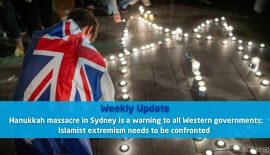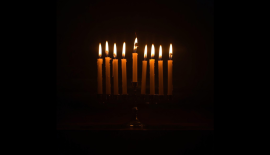Understanding the myriad threats facing Israel
Throughout history, the Jewish people and more recently the State of Israel have always faced existential threats. Today, they are in the midst of a deep crisis, which is manifesting on many fronts. The challenges are both internal and external. It is important to be aware of these issues, and pray into them. In this update we note a few of them.
Tensions are escalating in the Palestinian-controlled territories and cities. The IDF is carrying out continual operations to take out terrorist cells. There has been a wave of Palestinian attacks on Jews in recent months. In the last month alone, fourteen innocent Israeli Jews have been killed. Most recently, two brothers Hallel and Yagel Yaniv were murdered as they drove through a Palestinian village in Samaria, and Israeli-US citizen Elan Ganeles was shot to death as he drove near Jericho. This triggered radical Israeli settlers to attack the area of Huwara, burning houses and cars resulting in massive damage. Many Israeli leaders have distanced themselves from this attack, calling on their fellow Israelis that this is not the way to deal with the problem. Unfortunately, however, some Israeli leaders have condoned and even incited settler violence.
The new Netanyahu-led government is persisting in its plans to carry out reform of the judiciary. This issue is dividing the country. The controversial plans are meeting wide scale opposition. Law enforcers have intervened with force at the protests. President Herzog has warned these proposals may cause major lasting divisions in Israeli society. However, there are many who consider that reform of some kind is necessary to redress the wide-ranging role the Supreme Court has claimed over recent decades. This issue highlights the fact that Israel lacks a constitution that clearly delineates the respective powers of judiciary, executive and legislature. We must pray that the Lord will somehow use this process to bring good to the people of Israel.
Another factor contributing to the unrest and conflict is that the leaders of the religious nationalist parties in the coalition have been given wide-ranging powers in the disputed territories over the army and police.
These religious parties advocate extension of Israeli sovereignty over the territories – an issue that is highly divisive in Israel and the wider Jewish world. Plans have been approved to allow further construction of homes for Israeli citizens in these territories.
Behind the scenes, there is a battle for ownership and control of land. The Palestinian Authority, assisted by the EU and other partners, is actively extending Palestinian control over Area C. This includes construction of buildings and infrastructure in breach of Israeli law and the Oslo Accords.
At the same time, Israel faces an ongoing relentless assault on its sovereignty as a nation state within the United Nations and related institutions. Israel insists on its right to negotiate with the Palestinians the terms of their self-determination. The Palestinian leadership insists that the international community should recognize it as a state with (East) Jerusalem as its capital, and makes no secret of its goals to undermine and destroy the Jewish State. Most immediately, it has mobilised a small number (less than half) of UN member states, many of whom do not even recognize Israel’s existence, to ask the International Court of Justice to issue an Advisory Opinion on the legality of “the ongoing violation by Israel of the right of the Palestinian people to self-determination, from its prolonged occupation, settlement and annexation of the Palestinian territory occupied since 1967, including measures aimed at altering the demographic composition, character and status of the Holy City of Jerusalem, and from its adoption of related discriminatory legislation and measures.”
The one-sided framing of the question shows that the proceedings are likely to be strongly biased against Israel.
The proponents of this move are unlikely to inform the court about the broader regional context within which the Israeli-Palestinian conflict is playing out. But Israel’s position in Jerusalem, Judea and Samaria cannot be understood without that context. For example, in the south, Hamas continues to threaten Israel with weapons supplied and financed by Iran, which in turn is close to achieving nuclear warhead capacity. In the north, Iran’s proxy Hezbollah has amassed a huge arsenal of rockets directed at Israeli cities. To the east, Syria remains a hotbed of entities and regimes hostile to Israel.
In this context, Israeli dismantling of its security apparatus and withdrawal from the “occupied” territories (the mountains of Judea and Samaria) would be suicidal.
These are challenging and complicated times. In an effort to help understand the issues we are organizing a conference in The Hague on 29th and 30th March. The focus of the conference is on Israel’s position in the UN, and the international context, but it will also touch on the regional context and some of the internal issues in Israel.
Don’t miss this unique opportunity to learn more about the international threats and opportunities facing Israel and all the people of the region!
Hady Amr’s transformational policy
Caroline Glick writes at JNS: “U.S. Special Representative for Palestinian Affairs Hady Amr’s visited Israel and Jordan this week. Under his leadership, the Biden administration has abandoned U.S. support for Israel in favor of support for Palestinian terrorists and their war against the Jewish state.”
Read more..
Israel on Trial – Conference 29-30 March 2023
A line-up of excellent speakers will unpack the attacks on Israel within the UN and other international institutions, and prospects for resolution of the conflict. Speakers include Hillel Neuer (UN Watch), Kurdish international lawyer Radby Loqman and a young Palestinian leader from Bethlehem. Sign up now!
Read more..
A judge of righteousness
Tal Hartiv writes at C4I: “Miriam ben Porat was a woman who led in so many ways. When it came to her specialised field of the judiciary, she was a trailblazer. Ben Porat was one of the first women to serve as professor of Law at the Hebrew University of Jerusalem.”
Read more..
Interview with Danielle Mor
Danielle Mor has been working for The Jewish Agency for 22 years. She plays a vital role in helping Jewish people from all over the world making Aliyah. In her capacity as Director Christian Friends of The Jewish Agency, she also works together with a number of (Christian) organizations that are involved in helping the Jewish people return to Israel.
SCRIPTURE FOR THE WEEK
Jeremiah 23:1-8
““Woe to the shepherds who are destroying and scattering the sheep of my pasture!” declares the LORD. Therefore this is what the LORD, the God of Israel, says to the shepherds who tend My people: “Because you have scattered My flock and driven them away and have not bestowed care on them, I will bestow punishment on you for the evil you have done,” declares the LORD. “I myself will gather the remnant of My flock out of all the countries where I have driven them and will bring them back to their pasture, where they will be fruitful and increase in number. I will place shepherds over them who will tend them, and they will no longer be afraid or terrified, nor will any be missing,” declares the LORD. “The days are coming,” declares the LORD, “when I will raise up for David a righteous Branch, a King who will reign wisely and do what is just and right in the land. In His days Judah will be saved and Israel will live in safety. This is the name by which He will be called: The Lord Our Righteous Savior. “So then, the days are coming,” declares the LORD, “when people will no longer say, ‘As surely as the LORD lives, who brought the Israelites up out of Egypt,’ but they will say, ‘As surely as the LORD lives, who brought the descendants of Israel up out of the land of the north and out of all the countries where He had banished them.’ Then they will live in their own land.””




